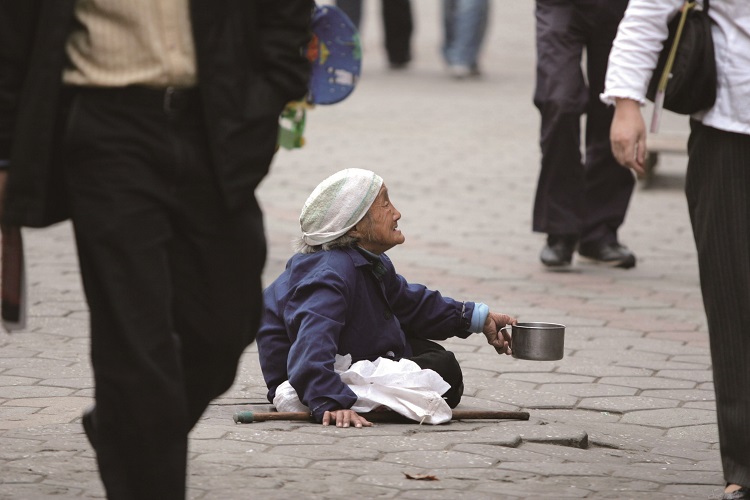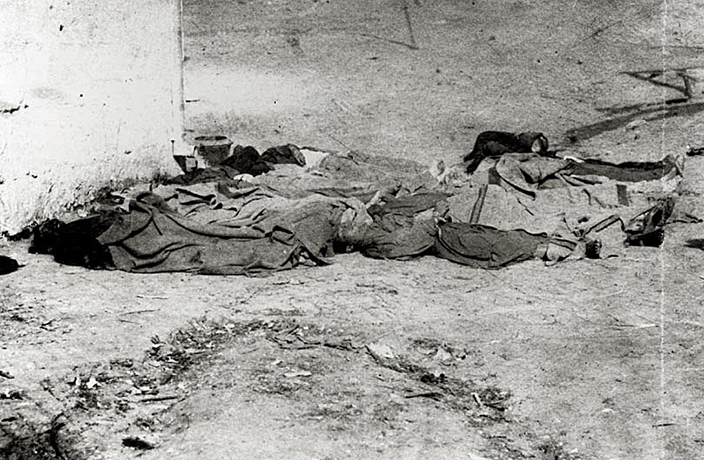At 12pm on a Monday, Dongmen in Shenzhen is packed with people. A gray-haired woman in an ill-fitting dark blue coat, black trousers and shabby cloth shoes carries a bag on her shoulder and an empty plastic cup in her hand. Without even speaking, people passing her already know she’s a beggar and avoid eye contact.
Searching for the best location to beg, she eventually decides on the intersection of two walking streets. It’s a smart choice; nearby are several street food booths. People will have some change in their pockets after buying snacks. Plus, with 1234 Space Mall so close, there should be steady foot traffic all day.
She begins. Walking up to a well-dressed young lady at one of the stalls, she says, “Xie xie, xie xie, bang bang mang ba” (‘Thank you, thank you, please help’). She repeats the mantra and thrusts her plastic cup toward the lady. The lady turns to her slightly, glances at her face and keeps walking.
Following her, the beggar repeats “Xie xie, xie xie.” Finally, the lady stops, pulls a coin out of her purse and drops it into the cup. The beggar gets her first coin in only two minutes.
It’s not always quick though. The beggar approaches a group of young men who are smoking, talking and laughing by a trashcan. Reaching her cup towards them, she repeats her earlier phrases. Without even glancing at her, they immediately shake their heads and hands then walk away.
The beggar shuffles after them for a while, until she finds her third client: a middle-aged foreign man standing with a suitcase. She greats him in English: “Hello! Hello!” and shakes her cup, the lone coin rattling inside. He gives her a coin. Unsatisfied, she shakes the cup again. The man looks into his wallet and finds another coin. “Xie xie, bye bye,” she says, smiling.
She works the area for an hour, approaching over 40 people. The three coins are all she gets. Tired and thirsty, she checks the bin near the food booths. She finds a large coke, throws away the straw and drinks the rest in seconds.
A schoolgirl sees this and gives her some small bills. She takes the bills, nods to the girl. After the lunch break, she starts begging again.
She identifies herself only as Wang. Following some prompting, she begins to relate the story of how she became a beggar:
I try to save all the money, so I never buy food or cook for
myself. It’s not difficult to find three meals and water on the street
I’ve been here for more than a month. Before coming to Shenzhen, I had a business in Changchun, Jilin Province.
I’m 61 years old and my husband is 64 years old. We have a son and a daughter. The four of us ran a business together, had it good for years.
We used to have our own greatly successful scrap recycling company in Changchun. Then in 2008, there was a financial crisis. Normally we could sell the scrap for RMB8 per kilo, but at that time, we could only sell it for RMB4 or even less. We still had to pay the bills for our small company though, which we couldn’t afford. Eventually, the business failed.
When this happened, we owed over RMB200,000. We moved back to our hometown in Jiangsu Province. We sold our house in Jiangsu later, but it still was not enough. We tried to borrow money from our relatives and friends but only my three younger siblings could help a little.
Since losing the business, my son has become a delivery man in Jiangsu. My daughter is a housewife and has no job currently. My son has two kids, a boy and a girl. My daughter has a little girl, so my husband stays with them and helps them to take care of the kids.
We did all we could to pay the debt, and with the help of my siblings, were able to pay off our debt last year. Our life doesn’t compare to what it once was. However, after what we’ve been through, I’m satisfied with my life now and don’t complain.
I came of my own freewill to beg. At first my family didn’t want me to because I have hypertension. However, I insisted.
I’d never been to Shenzhen before, only heard of it in the news. I knew there were many rich people living in Shenzhen, there’s a saying about it: ‘Money is everywhere in Shenzhen.’
I thought, ‘Why not go there and give it a try? I’m not too old, no need to be a burden on my kids now.’ Besides, being here is better than staying in Jiangsu and getting mocked for my failure.
I live a very simple life. I share a small room with two other beggars around my age. The place we stay isn’t far from Dongmen, and there’s a local market nearby. My roommates also came from Jiangsu by themselves. It’s better as a beggar to stay with people from the same place as you.
My roommates and I beg in different spots, all close to our home. Our room is RMB300 a month. My share is RMB100. On a good day I can earn around RMB60, but mostly I earn RMB30 to 40 per day. I try to save all the money, so I never buy food or cook for myself. It’s not difficult to find three meals and water on the street.
My kids want me to go back home because they are worried about my health. They bought me a cellphone before I left home and call me every day since I moved to Shenzhen. I’ll go back to Jiangsu in a month to see them.
Now, I’m earning money for the train ticket. I’m sure I’ll be able to make enough before then. I’m not sure if I’m coming back here again after Chinese New Year. I might go to some other cities. Shenzhen is a good place to stay, warmer than my hometown. Nobody knows me, so I don’t feel embarrassed.
At the opposite end of the city, in the affluent foreign area around Sea World, a 30-something female beggar in a wheelchair often sits on a busy corner. Her tale is equally moving:
I can’t go far in a wheelchair, which means I don’t earn as much as those who can walk
I came four months ago from Zhengzhou, Henan Province. Someone told me Shenzhen was a place with ‘good chances.’
I can’t walk because I had polio when I was 8. After that I became disabled and had to spend the rest of my life in a wheelchair. When you are like this, nobody wants to hire you and give you a job.
My oldest brother lives in Zhengzhou. However, he can’t help me much. He’s married and has his own family to take care of now.
During the daytime I stay here and go back to my place late at night. Sometimes people will bring me lunch or dinner, if not I spend RMB2 to buy some bread or noodles.
I can’t go far in a wheelchair, which means I don’t earn as much as those who can walk. The most I can get in a day is about RMB40. Sometimes I only earn RMB7 or RMB8 a day.
I stay here because Shenzhen’s weather is good for my legs. The cold makes my legs hurt, and living here, that isn’t a problem.
It’s difficult to know the truth of such accounts. While undoubtedly many need help, how many others are merely acting? After all, portraying tragedy is a beggar’s trade – and for some it can be quite lucrative. Just last September, photos emerged of a panhandler in Beijing counting mountains of money, allegedly totaling around RMB10,000.
Nevertheless, seeing the destitute appearance of these simple folk, it’s hard not to cast a sympathetic eye on their sad stories.
// If you are interested in helping those less fortunate, contact the Shenzhen Aid Center on 8243 4840 or 8243 3326 (Chinese only).






















0 User Comments